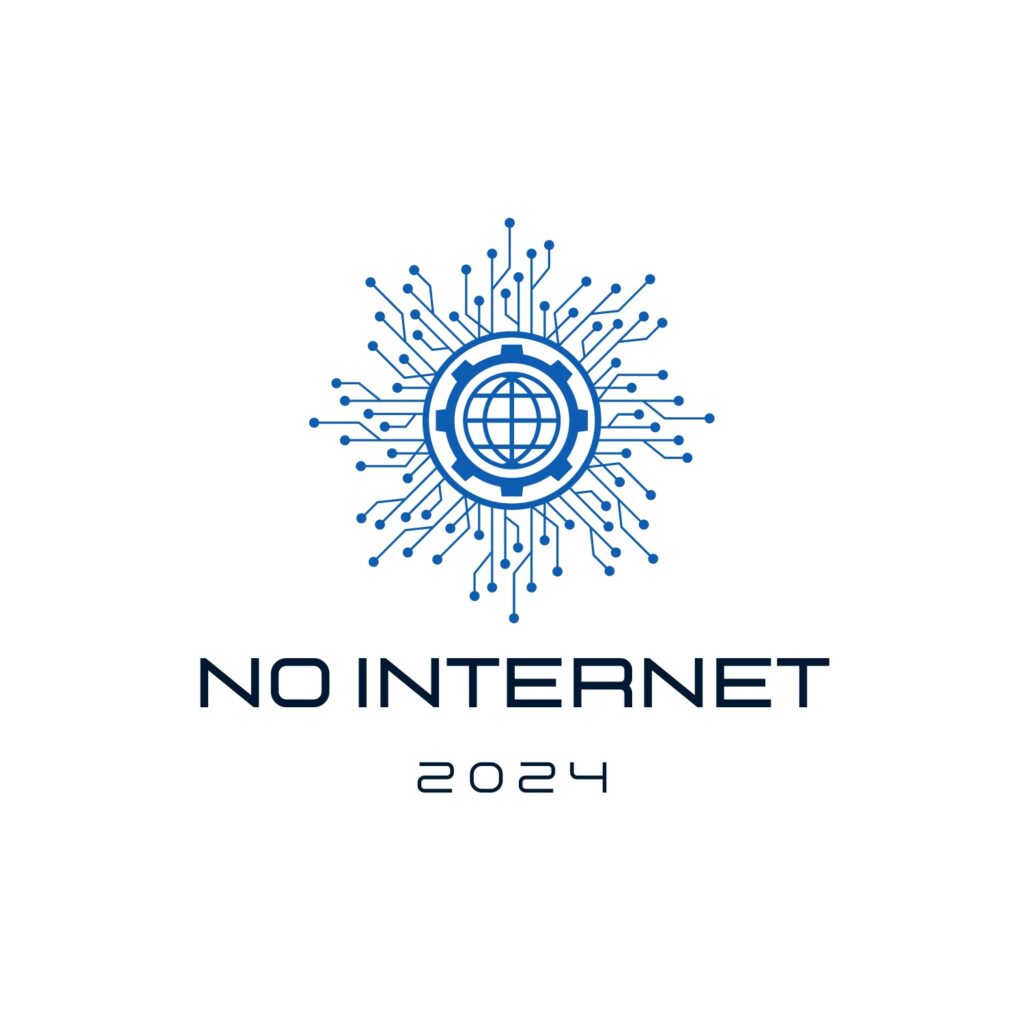The year 2024 arrives with an unexpected twist—the absence of the internet. This scenario triggers a ripple effect across various aspects of daily life, reshaping communication, business, education, and more. In this exploration, we will delve into the potential consequences, ramifications, and adaptations required in a world where the internet is no longer an integral part of our existence.
Communication:
- Loss of Instant Connectivity:The instantaneous nature of modern communication, facilitated by email, messaging apps, and social media, would be eradicated. People would need to adjust to the delayed pace of traditional communication methods such as postal services and phone calls.
- Impact on Personal Relationships:Long-distance relationships, which often rely on constant digital communication, would face challenges. The need for more intentional and patient communication might foster a return to deeper connections.
- Challenges for Businesses:Businesses accustomed to swift communication for decision-making and collaboration would experience disruptions, potentially affecting productivity and efficiency.
- Impact on Global Communication:The interconnectedness of the world through the internet has transformed global communication. Its absence would slow down international interactions, affecting diplomatic relations, business partnerships, and cultural exchanges.
- Challenges for International Businesses:Multinational corporations heavily relying on internet-based communication for coordination and decision-making would need to devise alternative strategies to maintain their global operations.
Business and Economy:
- Disruption to Online Business:The vibrant world of e-commerce, online services, and digital business operations would come to a standstill. Businesses would need to reinvent their models, returning to traditional brick-and-mortar approaches.
- Resurgence of Physical Stores:Traditional physical stores, once overshadowed by online giants, would experience a resurgence. Businesses might need to invest in revitalizing in-person shopping experiences.
- Impact on Startups:Startup ecosystems, often born and thriving in the digital realm, would need to adapt or face substantial setbacks. The lack of internet platforms for funding, collaboration, and marketing would reshape the startup landscape.
- Job Market Shifts:Industries that heavily rely on the internet, such as remote work, digital marketing, and tech-focused roles, would witness significant challenges.
- Emergence of New Job Opportunities:Conversely, industries unaffected by the lack of internet might experience growth, leading to the creation of new job opportunities in areas like manufacturing, agriculture, and local services.
- Impact on Freelancers and Remote Workers:Freelancers and remote workers, accustomed to the flexibility afforded by the internet, would need to adapt to a more localized job market.
Education:
- Shift in Learning Models:Online education, e-learning platforms, and digital resources have become integral to the modern educational landscape. The disappearance of the internet would force a return to traditional classroom-based education.
- Challenges for Distance Learning:Educational institutions offering distance learning programs would face challenges, requiring a reevaluation of their teaching methodologies and outreach strategies.
- Impact on Educational Access:Access to educational resources, particularly for individuals in remote areas, would be severely limited. Bridging the educational divide would become a significant societal challenge.
Information Access:
- Loss of Information Accessibility:The internet serves as a vast repository of information. Its absence would limit access to knowledge, news, research, and other resources that have become integral to decision-making and staying informed.
- Impact on Research and Innovation:Scientific research, which often relies on collaborative efforts and access to online databases, would experience a slowdown. Innovations and breakthroughs in various fields might be hindered.
- Challenges for Journalists:Journalists, accustomed to the rapid dissemination of information through online platforms, would need to adapt to a slower news cycle and rely on traditional news outlets.
Technology:
- Technological Stagnation:Innovation and technological progress, driven by collaboration and information sharing facilitated by the internet, would slow down significantly.
- Impact on Technological Advancements:Emerging technologies like artificial intelligence, blockchain, and the Internet of Things (IoT), which thrive on interconnected systems, would face stagnation in their development.
- Challenges for Tech Companies:Technology companies relying on the internet for research, development, and communication would need to find alternative means to sustain their operations.
Social Interaction:
- Impact on Social Networks:The absence of internet platforms would diminish the influence of online communities and social networks. Entertainment, news, and trends would revert to spreading through traditional media channels.
- Revival of Local Communities:Local communities and neighborhood connections might experience a revival as people seek social interactions in their immediate physical surroundings.
- Shift in Social Dynamics:The internet plays a significant role in shaping societal norms and cultural shifts. Without it, the dynamics of how information is disseminated, trends are formed, and cultural influences spread would undergo a fundamental shift.
- Change in Social Dynamics:The internet plays a significant role in shaping societal norms and cultural shifts. Without it, the dynamics of how information is disseminated, trends are formed, and cultural influences spread would undergo a fundamental shift.
Government and Governance:
- Shift in Governance Models:Governments, often relying on digital systems for administration, communication, and citizen services, would need to revert to manual processes.
- Impact on Administrative Efficiency:Administrative processes would face challenges, potentially leading to inefficiencies in public services and bureaucratic functions.
- Transitioning to Paper-Based Systems:Government agencies would need to transition back to paper-based systems, affecting data management and record-keeping.
- National Security Implications:National security efforts, which heavily utilize digital intelligence and cybersecurity measures, would face new challenges in protecting nations without the internet.
- Impact on Cybersecurity:Cybersecurity measures would need to adapt to a landscape without the internet, potentially facing new threats and vulnerabilities.
Personal Lifestyle:
- Entertainment Changes:Streaming services, online gaming, and other internet-based entertainment platforms would vanish. People would need to adapt to traditional forms of entertainment, such as television, radio, and live performances.
- Return to Traditional Media Consumption:Traditional media, including television networks, radio stations, and print publications, would experience a resurgence as primary sources of entertainment and information.
- Challenges for the Entertainment Industry:The entertainment industry, heavily reliant on online distribution and streaming revenue, would need to reinvent its business models.
- Travel and Exploration:The absence of online maps, travel apps, and booking platforms would force people to rely on traditional methods for navigation and planning travel.
- Impact on Tourism Industry:The tourism industry, accustomed to online bookings and global travel marketing, would need to reinvent its strategies to attract travelers.
- Local Exploration:Travelers might shift their focus to local exploration, discovering hidden gems in their immediate surroundings.
Healthcare:
- Impact on Telemedicine:Telemedicine, which heavily relies on internet connectivity for virtual consultations, would be severely affected.
- Challenges for Remote Healthcare:Patients in remote areas or those unable to access physical healthcare facilities would face challenges in receiving medical advice and consultations.
- Reevaluation of Healthcare Technology:The healthcare industry would need to reevaluate its reliance on digital health technologies, potentially reverting to more traditional healthcare delivery models.
- Research Limitations:Medical research, which often involves collaboration and data sharing over the internet, would face obstacles. Progress in healthcare, including the development of new treatments and medications, might slow down.
- Impact on Global Health Initiatives:International collaboration on global health issues, particularly those that rely on data-sharing platforms, would be hindered.
In a world without the internet in 2024, the global community would face unprecedented challenges across all facets of life. The adaptations required would be profound, necessitating a reevaluation of societal structures, economic models, technological progress, and individual lifestyles. While the absence of the internet would undoubtedly bring about difficulties, it might also pave the way for a return to more localized, community-centric living, fostering resilience and resourcefulness in the face of this unexpected paradigm shift. As we navigate this hypothetical scenario, the ability to adapt and innovate becomes paramount for individuals, communities, and nations alike.
Consulting, Technology, E-commerce, Digital, Media, Cloud, Operations & Staffing. Alumni of Pune University.























